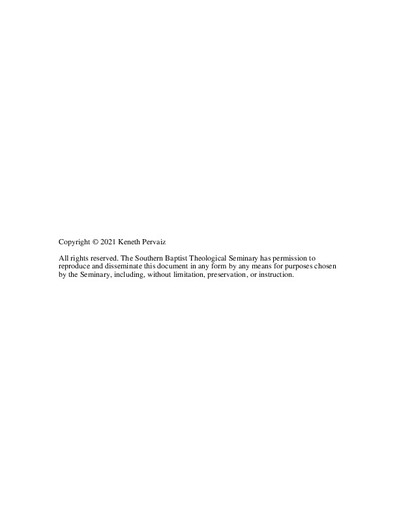| dc.contributor.advisor | Williams, Jarvis J. | |
| dc.contributor.author | Pervaiz, Keneth | |
| dc.date.accessioned | 2021-11-24T21:40:28Z | |
| dc.date.available | 2021-11-24T21:40:28Z | |
| dc.date.issued | 2021-11-23 | |
| dc.identifier.uri | https://hdl.handle.net/10392/6649 | |
| dc.description.abstract | This dissertation examines the mixed table-fellowship conflict between Paul and Peter at Antioch in Galatians 2:11–21 in light of the divine and human agency model. This project argues that Paul’s confrontation with Peter at the mixed table-fellowship at Antioch should be understood as a conflict between two competing understandings of agency. That is, Peter’s withdrawal from the mixed table-fellowship between Jews and Gentiles at Antioch suggested the priority of a distinct Jewish identity constructed by the human agent through the observance of Jewish table-fellowship practices based on the Torah, and thus minimized the divine action in Christ (Gal 2:14). However, Paul’s direct rebuke to Peter suggested the priority of divine agency (Gal 2:11, 14, 15–21). Paul’s remarks in Gal 2:15–21 teach that the believer’s distinct ethnic identity has been redefined because of God’s saving action in Christ. This study establishes the relationship between mixed table-fellowship, identity, and agency through a careful exegetical analysis of the crisis at Antioch in Galatians 2:11–21 in conversation with selected Second Temple Jewish texts. Chapter 1 introduces the main thesis, methodology of the project, and surveys the history of interpretation. Chapter 2 argues that food and table-fellowship practices primarily serve as an important center of identity formation on the individual and communal levels, creating a social bond within the group and a distinction from others outside the group. The next part of the dissertation (chaps. 3–4) focuses on selected Jewish texts from the Second Temple period (Letter of Aristeas, Joseph and Aseneth, Judith, and Additions to Esther). Chapter 3 argues that mixed table-fellowship restrictions observed by the Second Temple Jews in these ancient Jewish texts function to construct and prioritize a distinct Jewish identity through Jewish observance of food and table-fellowship practices. Chapter 4 further enhances the argument by establishing the relationship between mixed table-fellowship, the Torah and divine-human agency in selected Second Temple Jewish texts. The final section of the dissertation (chaps. 5–6) focuses on Paul’s letter to the Galatians, with particular attention given to Galatians 2:11–21. Chapter 5 examines the Antiochene crisis in light of the identity theme by arguing that the mixed table-fellowship conflict at Antioch fundamentally reveals an underlying conflict of ethnic identity. Chapter 6 establishes the relationship between the mixed table-fellowship, identity, and divine-human agency in Galatians 2:11–21. This chapter argues that Paul and Peter’s table-fellowship conflict over ethnic identity signifies a conflict between two competing notions of agency. Chapter 7 summarizes the previous chapters and offers a comparative analysis of Galatians 2:11–21 and selected Second Temple Jewish texts based on the exegetical conclusions drawn from both Pauline and Jewish texts discussed in this study. Finally, this chapter highlights the scholarly contribution made in this study, areas of possible further research, and an application of this research in a Pakistani context. | en_US |
| dc.subject.lcsh | Bible. Galatians II, 11-21--Criticism, interpretation, etc. | en_US |
| dc.subject.lcsh | Fellowship--Religious aspects | en_US |
| dc.subject.lcsh | Jews--Dietary laws | en_US |
| dc.subject.lcsh | Jews--Identity | en_US |
| dc.subject.lcsh | Free will and determinism--Biblical teaching | en_US |
| dc.subject.lcsh | Providence and government of God | en_US |
| dc.subject.lcsh | Jewish literature--History and criticism | en_US |
| dc.title | Identity and Agency in the Crisis at Antioch: A Comparative Study of Galatians 2:11–21 and Selected Second Temple Jewish Texts | en_US |
| dc.type | Electronic dissertation | en_US |
| dc.type | Text | |
| dc.contributor.committee | Schreiner, Thomas R. | |
| dc.contributor.committee | Vickers, Brian J. | |
| dc.type.qualificationname | Ph.D. | en_US |
| dc.publisher.institution | Southern Baptist Theological Seminary | en_US |
| dc.publisher.department | School of Theology | |

